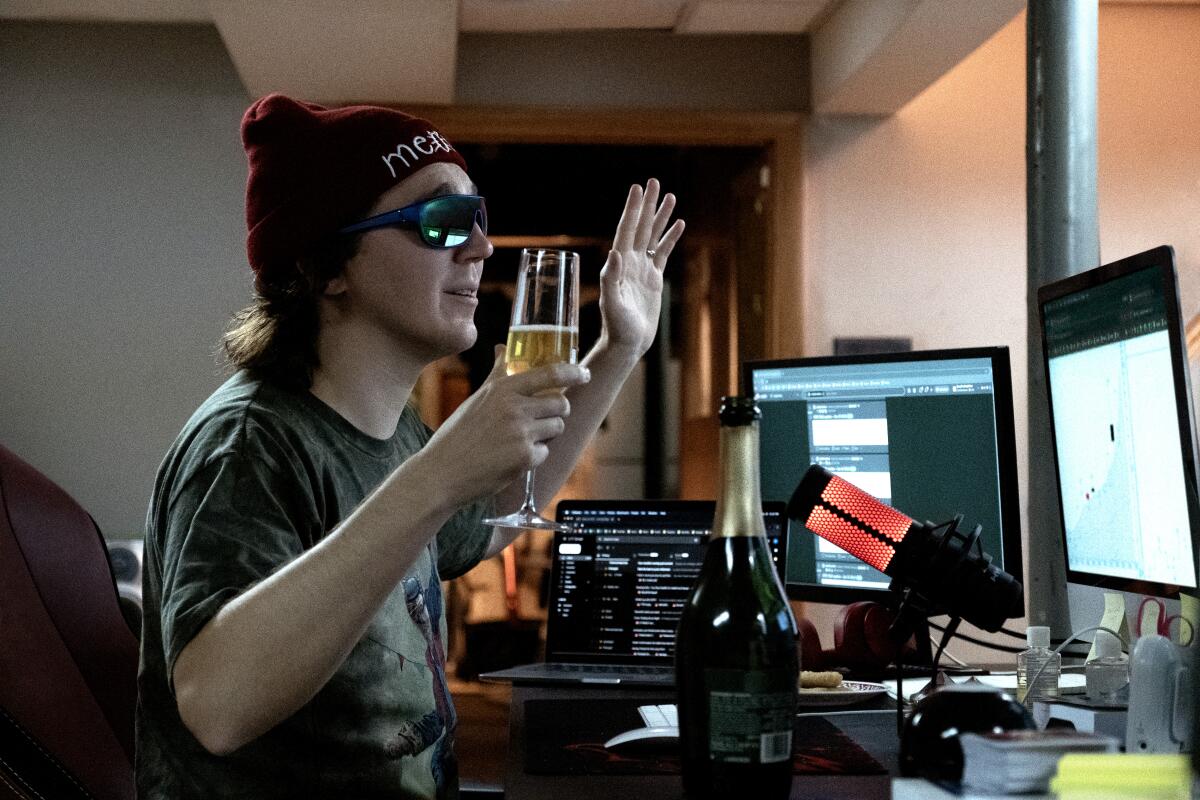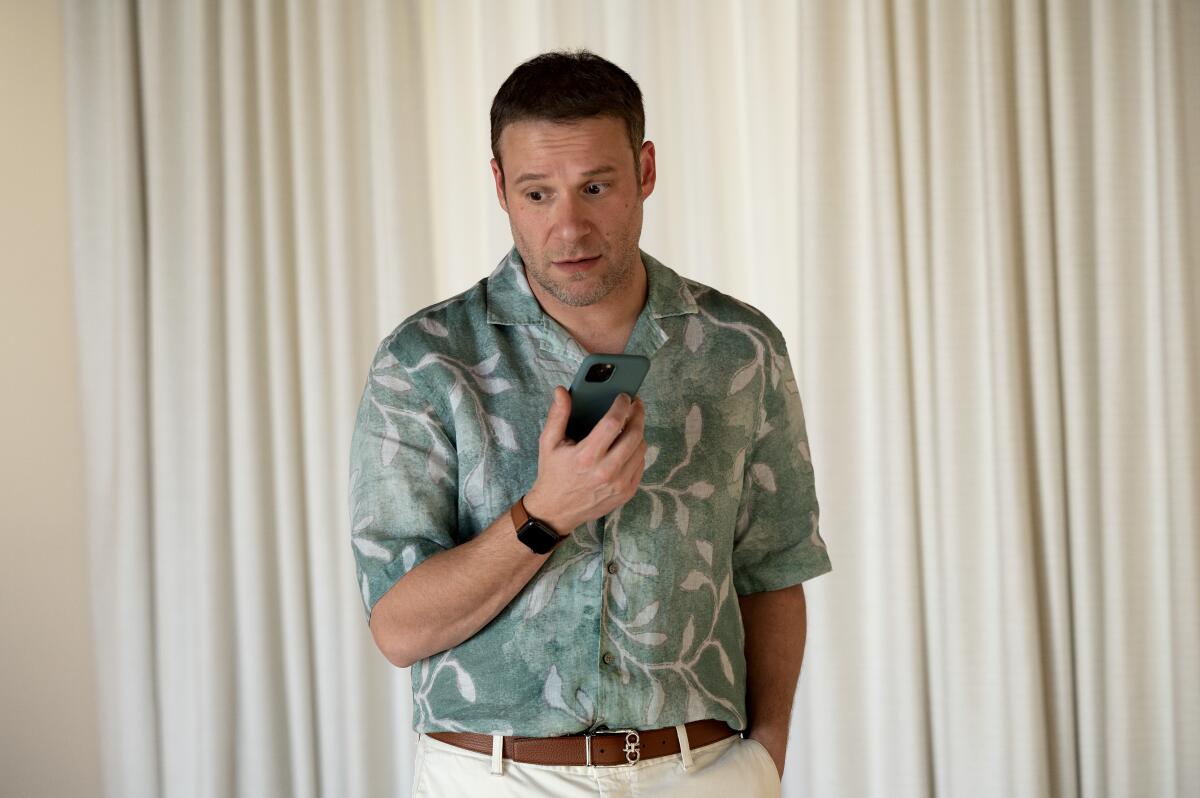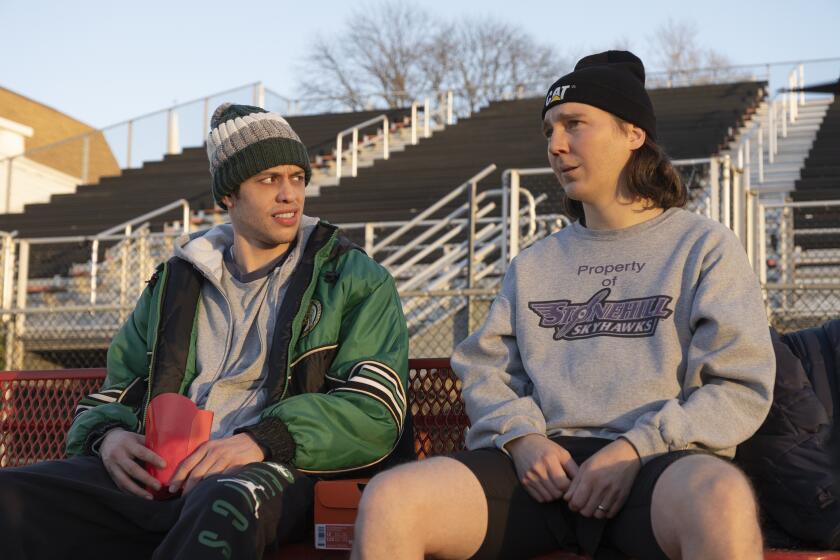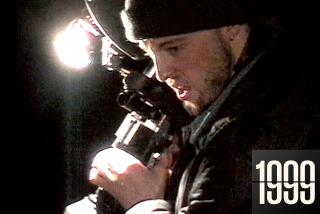How do you make an online community vibrant? Invent a new language of cinema, of course

“Just invent a new language of cinema.”
Simple enough, right?
This was a producer’s directive before we started our script about the GameStop short squeeze, a complex financial saga that rocked Wall Street in 2021.
The real-life story brought together thousands of regular people, isolated in the pandemic and united by their desire to teach predatory billionaires a lesson — and make some money doing it. These people never met. They were never in the same room with each other. Their leader, our hero, was a brilliant eccentric who wore cat T-shirts and went by the online moniker Roaring Kitty. Their chief antagonist was a low-key hedge-fund manager named Gabe Plotkin, who has never publicly acknowledged their existence.
Starring Paul Dano as the likable, unassuming basement trader Keith Gill, director Craig Gillespie’s comedy turns a pandemic craze into a populist showdown.
Our task was to create an ensemble dramedy that moved at the breakneck speed of social media, weaving together these disparate stories into a cohesive whole. To make it emotional. And to do it fast.
The result is our film “Dumb Money,” which premiered at the Toronto Film Festival in September and opened in theaters a week later. It is an intricate technical drama in the tradition of “Moneyball” and “The Big Short.” It is a movie about internet populism à la Frank Capra — if Mr. Smith went to Reddit. And it is a period piece about an all-too-recent time no one wants to revisit. So in addition to the challenge of dramatizing a story that mostly happened between people and their computers, we had the added hurdle of COVID, meaning if we were faithful to the time, many of those people would be in masks.
Without cheating, how could we bring these far-flung characters together into high-stakes emotional relationships that built to a dramatic showdown? And how could we make the action propulsive, visceral, and cinematic?
Invent a new language of cinema. Or, more accurately, study the greats who came before us and integrate their revelations with a few of our own.

Our first breakthrough came when we cracked the film’s opening after many false starts. We wanted to find a way to have our reluctant hero, Roaring Kitty, face off against our “villain,” Plotkin. These two have never been together in person, but their antagonism is the primary relationship driving our story. They have a parasocial relationship, no less intense than the social kind, but always mediated by a screen.
Our instinct was to open the film with the high contrast between Gabe’s comfortable pandemic life, in side-by-side waterfront mansions in Miami, with Roaring Kitty’s working-class setup in frigid, suburban Boston. Ideally, we wanted a face-off between the two men that called to mind the best of John Ford. Two gunslingers preparing to duel.
We came up with a sequence where the men’s remote existences are oddly similar: Gabe, played by Seth Rogen, runs awkwardly between his mansions; Roaring Kitty, played by Paul Dano, runs around the high school track. We choreographed the sequence on the page to “WAP,” a pandemic banger by Cardi B and Megan Thee Stallion, which we felt set the appropriate tone for the film, capturing the rollicking, high-energy, vulgar attitude of social media. The sequence culminates with Gabe becoming aware of Roaring Kitty for the first time. He watches one of Roaring Kitty’s nerdy, homespun investment videos, freezing it at a key moment. Roaring Kitty, smiling, stares out from Gabe’s computer screen. Gabe stares back at him: “Who is this schmuck?” With that, they were ready to walk their paces, turn and shoot.
When this worked on the page, we began to see how we could use the tools of cinema to jam total strangers into intense emotional relationships. To show their differences in high relief, but also to show unexpected similarities. We used small moments, like both men washing their children’s dinner plates, to help us show the shared humanity of people who are diametric opposites.
One effect of the social media age is that it flattens our enemies down to two-dimensional stereotypes. We sought to capture this dynamic in all its messiness and show how limiting and destructive it can be. In one sequence, the billionaires talk about burning down GameStop because the company is worthless. We run their conversation over scenes of Anthony Ramos, as a GameStop employee, earnestly laboring in this “worthless” business, which happens to be the center of his community and life. In a different sequence, our ensemble characters take turns reading an online screed caricaturing billionaires as yacht-bound playboys. This audio plays over more intimate moments for Gabe, a devoted father, having a family dinner and reading to his son.

In our online lives, we are reducing each other to crude stereotypes. Our goal with this project was to pull back the camera on that dynamic, inviting audiences to find human connections to every character on screen.
Our next task was to show an army beginning to mass behind Roaring Kitty — a sui generis populist movement taking shape on Reddit, TikTok and other social media.
For that, we had a bit of practice. The GameStop saga isn’t the first instance of internet populism we’ve sought to capture on film, it’s merely the first project that actually made it into theaters. Taking inspiration from Capra, as well as the greatest internet-era films like “The Social Network,” we used an assortment of techniques to bring our characters together when we didn’t have the luxury of physical proximity.
We studied how ideas spread online: through phrases, jokes, songs, images, videos and memes. Key rallying cries — “If he’s in, I’m in,” for example — pass from one character to another, building into a kind of chant. We slammed one scene into another, time and again, so one character finished another’s sentence, continued their song lyric, built on their still-forming idea. This was our bid to make real those ephemeral online spaces where people find community in the modern age.
We also wanted to bring real voices from those spaces into our script and onto the screen. That felt, to us, like a modern answer to Capra’s radical idea, of elevating the trials and tribulations of everyday life to the stuff of cinema.
The writers of ‘Dumb Money’ explain why they can accept box-office failure if it means long-term dignity and stability for Hollywood workers.
The GameStop movement hinged on complex financial concepts that defy easy explanation. These people didn’t need Margot Robbie in a bathtub explaining shorting (as she did so masterfully in “The Big Short”) — they had each other. We grabbed dozens of their actual TikTok videos and wrote them into our script, so they play right alongside the performances of Dano, Rogen, Shailene Woodley, Sebastian Stan and the rest of our tremendous cast.
All told, it may not amount to a new language of cinema. But these components helped us scaffold a uniquely modern story: strangers, brought together around an idea, engaging in intense emotional relationships that rocket toward an oddly satisfying conclusion.
In real life, most of them still haven’t met and never will.
But we’ve now heard from hundreds who actually did meet: in theaters, watching our film.
More to Read
From the Oscars to the Emmys.
Get the Envelope newsletter for exclusive awards season coverage, behind-the-scenes stories from the Envelope podcast and columnist Glenn Whipp’s must-read analysis.
You may occasionally receive promotional content from the Los Angeles Times.








